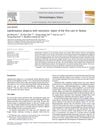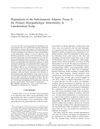TLDR A 66-year-old woman's thick scalp and hair loss were confirmed as lipedematous alopecia, a rare condition possibly influenced by genetics, with no effective treatment known.
In the 2019 case study, a 66-year-old African woman with a lifelong history of diffuse hair loss and a thickened scalp was diagnosed with lipedematous alopecia, a rare condition that leads to non-scarring but permanent hair loss. Despite inconclusive clinical and trichoscopic examinations, histopathological and radiologic analyses revealed a significantly thickened subcutaneous adipose tissue layer, which was 12 mm compared to the normal 3 mm, confirming the diagnosis. The patient's lack of response to minoxidil treatment and her family history suggested a genetic predisposition. This case, being the 93rd reported, highlighted the need for palpation in clinical exams and questioned whether lipedematous alopecia is a distinct condition or a combination of two separate disorders. Due to limited data on treatment efficacy, only symptomatic treatment was recommended.
 2 citations
,
January 2011 in “Dermatologica Sinica”
2 citations
,
January 2011 in “Dermatologica Sinica” Taiwan reported its first case of a rare scalp condition with no clear cause or treatment.
30 citations
,
May 2008 in “International Journal of Dermatology” Lipedematous alopecia causes permanent hair loss due to increased scalp fat.
 28 citations
,
January 2007 in “Journal of dermatology”
28 citations
,
January 2007 in “Journal of dermatology” Three white adults had a rare scalp condition with increased fat and sometimes hair loss, suggesting it's not limited to black women and might be more widespread.
 32 citations
,
June 2003 in “The American Journal of Dermatopathology”
32 citations
,
June 2003 in “The American Journal of Dermatopathology” Lipedematous scalp is mainly caused by an increase in fat tissue under the skin and is different from lipedematous alopecia.
30 citations
,
July 1998 in “British Journal of Dermatology” Fat cells slow hair cell growth but speed up their development.
 1 citations
,
August 2022 in “JAAD case reports”
1 citations
,
August 2022 in “JAAD case reports” Tofacitinib and oral minoxidil may help treat Sisaipho alopecia areata.
 April 2022 in “Journal of Cosmetic Dermatology”
April 2022 in “Journal of Cosmetic Dermatology” Trimax-360 Serum, when used for 98 days, safely and effectively improves hair growth, thickness, and density without any side effects.
 5 citations
,
January 2020 in “Journal of Dermatology”
5 citations
,
January 2020 in “Journal of Dermatology” Temporal hair loss relates to overall scalp hair loss in women.
 April 2019 in “Journal of Investigative Dermatology”
April 2019 in “Journal of Investigative Dermatology” Women with scarring alopecia are less likely to have used hormone replacement therapy or oral contraceptives compared to those with female pattern hair loss.
 11 citations
,
May 2011 in “Journal of Cutaneous Medicine and Surgery”
11 citations
,
May 2011 in “Journal of Cutaneous Medicine and Surgery” Break dancing on the head may cause a type of scarring hair loss that needs early treatment to prevent permanent damage.
 41 citations
,
December 2008 in “International Journal of Dermatology”
41 citations
,
December 2008 in “International Journal of Dermatology” South Korean women with hair loss have lower hair density and thickness compared to healthy women.
 28 citations
,
September 1998 in “Medical Clinics of North America”
28 citations
,
September 1998 in “Medical Clinics of North America” Most hair loss can be diagnosed with patient history and physical exam, and a few common types make up most cases.
 5 citations
,
October 1988 in “Clinics in Dermatology”
5 citations
,
October 1988 in “Clinics in Dermatology” Minoxidil promotes hair growth but exact mechanism is unknown.











